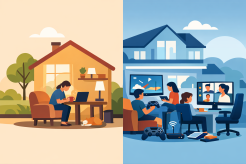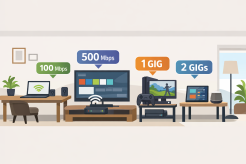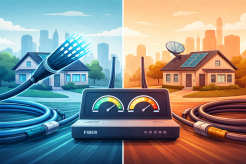How to get faster internet speed during COVID-19?

Get internet faster: Due to the COVID-19 pandemic, many Americans are now working from home, and students are concluding the school year online. As a result, as individuals try to stream, videoconference, and download at much higher rates than ever before, internet speeds are starting to suffer across the country.
According to the New York Times, AT&T recorded a 27% rise in traffic month over month, while Verizon had a 22% increase. It's no surprise, then, that cities with huge populations are experiencing significant slowdowns while citizens are required to stay at home. The median download speed in New York, for example, has plummeted by 24%.
The need for the internet during the coronavirus epidemic is the same whether you reside in a huge city or a sprawling suburb. The internet is your major link to work, friends, family, and leisure – a fact that is becoming increasingly apparent as more jurisdictions implement stay-at-home orders for non-essential workers.
Upgrading your internet service is the first thing to think about. However, we understand that money is tight right now. Follow these techniques to maximize your connectivity during the coronavirus outbreak if you're suffering internet lag and want to know how to get faster internet speed for cheap or even free.
Also, Read:
What is 5G and Why it Matters?
Choosing the Right 5G Hotspot For You
Disadvantages of 5G Network That You Might Still Not Know
5G mobile phones to look out for this 2021
Looking for an internet service provider?
Call us at 1-888-317-7540
How to get internet faster during COVID-19?
1. Position your router in the center of your home.
This results in a stronger signal and faster internet. It also aids in keeping your router off the ground.
2. Remove anything that could hinder your Wi-Fi signal from near your router.
Microwaves, baby monitors, and metal can all disrupt your Wi-Fi signal.
3. Make sure your modem is up to date.
Check with your internet service provider to see if the modem you have is compatible with the speeds you've chosen. If you're having problems with your rental modem, now is a good time to invest in one.
4. For your major devices try a hardwired broadband connection.
Instead of relying on Wi-Fi for everything now that you're spending so much time at home, it could be worth connecting your work computer or smart TV directly to your network.
5. Check the settings on your router.
It could be set to 20 MHz by default when it can support newer devices with greater speeds at 40 MHz.
6. Keep your family's data use to a minimum.
Either turn off the internet for the kids while you're at work or set data limitations on your router. You can set bandwidth and time limits.
7. Try to keep your personal usage to a minimum.
Reduce the quantity of data and devices you use for different activities if at all possible. Is having your video on during Zoom or Skype sessions really necessary? Because video streaming consumes more bandwidth, turning it off can help you avoid latency and other connectivity issues. Wherever practical, stream standard definition (SD) video rather than high definition (HD). Zoom, YouTube, Netflix, and more sites allow you to turn off HD video.
8. Clear your caches and update your browser.
Ignored updates and bloated history have an impact on the health of your browser. Cleaning out everything will help you boost your internet speed and loading times.
9. Invest in a Wi-Fi range extender.
A Wi-Fi extender may increase the range of your Wi-Fi, allowing you to get a better signal across your home. If you operate in an area with a dead zone, this could be extremely useful. Extenders for Wi-Fi can be inexpensive, but you may want to pay more for greater coverage.
Last but not least
Make sure your internet connection is optimized for fast internet speeds by checking your internet settings. Also, keep in mind any physical obstacles that could be generating extra internet lag. Finally, make sure your gear is up to par.
Yes, while individuals are isolated during the coronavirus pandemic, excessive internet traffic is an issue. However, by conducting a short assessment of your setup and equipment, you can reduce the impact on your own household.
Related Posts
 Internet Bundles
Broadband Deals
Internet Bundles
Broadband Deals
Best High-Speed Internet Plans for 2026
Discover the fastest high-speed internet plans. Compare fiber and cable options, speeds, and pricing to find the perfect plan for your home or business.
 Wifi
Wifi
How to Stay Connected: Free Wi-Fi Anywhere You Go
Discover the best ways to find free Wi-Fi anywhere you go, including cafés, stores, libraries, and travel hubs, plus tips to stay safe online.
 cheap internet offers
cheap internet offers
Value vs. Premium Internet Plans: Which One Fits You Best
Compare value vs. premium internet plans to find the best fit for your household. Learn pros, cons, speeds, and costs to make a smart choice.
 Internet Bundles
cheap internet deals
cheap internet offers
Internet Bundles
cheap internet deals
cheap internet offers
Windstream Internet Plans & Deals in 2026
What makes Windstream great is, internet service has no data cap, reliable internet, and there is always a real person to call when you needed help. Here, we are going to discuss what are the best Windstream deals, and details.
 Internet Bundles
Internet Bundles
Fiber Internet vs. Cable Internet: Which One Fits Your Home?
Compare fiber internet vs cable internet for speed, reliability, cost, and availability to find the best home internet option for your needs.